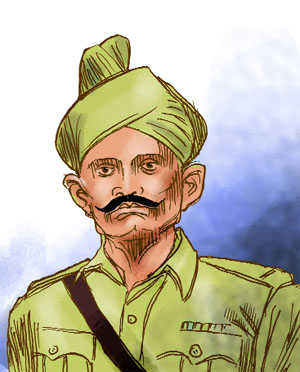Abdul Hafiz: Youngest Indian to get Victoria Cross
Col Dilbag Dabas (Retd)
“Post reorganise karo, mein covering fire doonga” (reorganise the post, I will give covering fire) were the last words of Jemadar Abdul Hafiz during the final assault on Nungshigun in the battle for Imphal during World War-II.
Among 27 Indians awarded Victoria Cross during World War-II, five were Haryanvis, and Jemadar Abdul Hafiz, son of present day Haryana, was one among the bravest of the braves. He was the youngest Indian to have been awarded the Victoria Cross, as also the first Indian to have been awarded the Victoria Cross in a battle fought on mainland India during World War-II.
Abdul Hafiz, son of Choudhry Nur Mohammed, a Rajput Musalman of Pawar gotra, was born in Kalanaur, a Muslim-majority town in Rohtak district of then undivided Punjab. Kalanaur remained most developed till 1947 with two madarsas and a high school from where Abdul Hafiz passed his matriculation. At that time there was a provision of granting Viceroy Commission to eligible Indian aspirants at the entry level itself. With Viceroy Commission on his shoulders, Jemadar Abdul Hafiz, just about 19 years then, was platoon commander of 10th platoon in D Company (Rajput Musalman Company) in 3 Jat Battalion. Jat battalions then were structured around two companies of Hindu Jats, one of Punjabi Musalmans and one of Rajput Musalmans.
On March 7, 1944, the Japanese launched a full scale offensive on India with their 15 and 31 Divisions tasked with capturing Imphal and Kohima, respectively. By March 28, Japanese cut the 90-mile Imphal-Kohima all weather motorable road, the lifeline of the Allied Forces operating in Imphal plains.
3 Jat Battalion, as part of 5th Indian Division, was airlifted from Arakans to Imphal and was deployed astride the Imphal-Ukhrul road, five miles north-east of Imphal town, in order to block this approach to the Imphal plains. On March 29, the battalion moved further north and took up position astride a track leading to a feature named Nungshigun with the D Company forward about seven miles north of Imphal.
In the early hours of April 6, the enemy attacked a standing patrol of four men and occupied the feature. As this feature overlooked the company’s position, its occupation by the enemy was dangerous. Therefore, the Company Commander, Major WD Ritchie, ordered Jemadar Abdul Hafiz to attack the enemy with two sections of his platoon at 9.30 am. The battle was witness to the most conspicuous act of bravery and supreme sacrifice by Abdul Hafiz that earned him the coveted Victoria Cross. The battle account is available in the War Diary of 3 Jat Battalion and also corroborated by book “For Valour” written by British historian Bryan Perrett.
(The writer is veteran Gunner, 6 Field Regiment)
The battle account as available in the War Diary of 3 Jat Battalion
On 6 April 1944, in broad day light, Jemadar Abdul Hafiz led his platoon in the attack which was up a bare slope with no cover and steep near the crest. Before the attack, Jemadar Abdul Hafiz assembled his jawans and convinced them that they were as invincible as Ali, the noblest warrior in the Prophet’s army. During the attack, when few yards below the crest, the enemy opened fire with machine guns inflicting several casualties on the attackers. Undeterred, Abdul Hafiz personally led the dash with the battle cry “Nara- e-Takbeer! Ya Ali!”.
The assault progressed with great dash up the last few yards of the hill feature, which were very steep. On reaching the crest, Abdul Hafiz was wounded in the leg, but seeing a machine gun firing from a flank, which had already caused many casualties on his men, he immediately dashed towards it and seizing the red hot barrel, pulled it upwards while another man killed the machine gunner.
Abdul Hafiz then took a Bren gun from a wounded jawan and moved towards the enemy, firing as he advanced and killing several of them. So fierce was the assault that the enemy, although present in superior strength, ran down the opposite slope of the hill feature. Regardless of the machine gun, which was firing at him from another feature, Jemadar Abdul Hafiz pursued the enemy, firing at them as they fled. At that moment, he was badly wounded in the chest from a machine gun fire and collapsed holding the Bren gun and attempting to fire, shouting at the same time “post reorganise karo, mein covering fire doonga”. He died shortly afterwards holding the Bren gun in his left hand, the gun whose trigger he could not pull to give covering fire.









